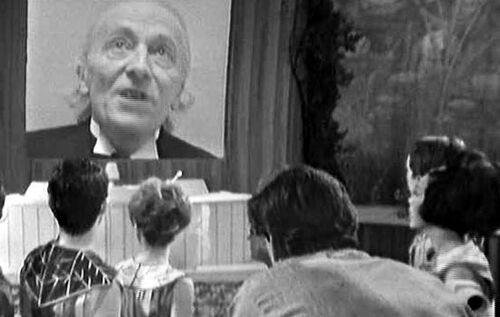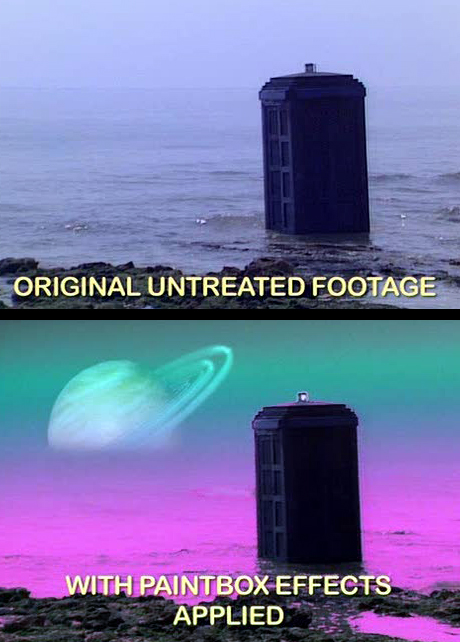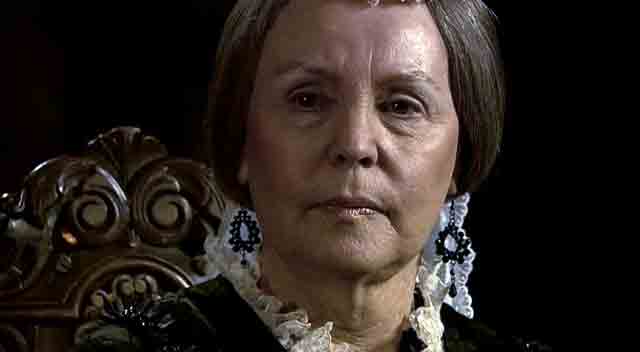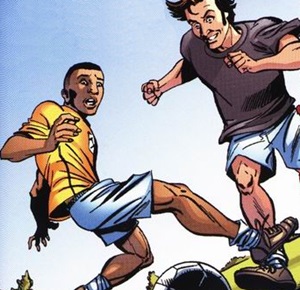More actions
Playback was a television production technique in which pre-recorded material was literally played into a scene, rather than being added as a post-production effect. It was universally used in the 1960s as the method by which actors were seen on view screens. As seen in the picture at the left, William Hartnell was pre-recorded separately, then projected live into the scene with the actors in the foreground. Though antiquated, the technique was used even into the 1980s, most notably for the title sequence. The quality of the opening titles for the 1963 version of Doctor Who was never high, because it was never a first-generation copy of the titles. Instead, they were played live into the recording of the first scene of many episodes, causing actors to have to time their first lines to the final notes of the studio-audible Doctor Who theme.
Think Doctor Who is just for boys? Don't you believe it. Not only was the show's very first producer a woman, but it would never have come back without the fierce advocacy of Jane Tranter and Julie Gardner. Considering her importance to Doctor Who it's somewhat ironic that Tranter's only on-screen credits are for Torchwood: Miracle Day. But Gardner, her "partner in crime", is tied only with Russell T Davies as the most prolific producer in Doctor Who history.
The careers of the Fifth, Sixth, Seventh and Eighth Doctors are significantly longer in audio than on television. Check out their latest works at category:2024 audio stories
Officially, only The Lodger has been explicitly adapted from a comic strip — also called The Lodger.
However, several stories have clearly taken material from comic strips — often those in Doctor Who Magazine. The Shakespeare Code contains a good amount of material from A Groatsworth of Wit, and the notion of the Doctor absorbing the time vortex in order to spare a companion was explored in both The Parting of the Ways and The Flood.
Donald Baverstock was the BBC executive who set the the wheels in motion that eventually led to the creation of Doctor Who. Essentially the original commissioner of the programme, he hired Sydney Newman and later imposed a sense of financial responsibility upon producer Verity Lambert.
But Baverstock wasn't the only BBC executive to have a profound impact on the development of Doctor Who. Make sure you read about Lorraine Heggessey, Mark Thompson, Danny Cohen, George Entwistle, Tony Hall, Shaun Sutton, Sydney Newman and others.- 1967
- Episode six of The Abominable Snowmen premiered on BBC1.
- Part two of the TV Comic story The Faithful Rocket Pack was published.
- 1972 - Part two of the TV Action comic story Steelfist was published.
- 1978 - Part two The Stones of Blood premiered on BBC1.
- 1981 - "The Forest of Fear" was repeated on BBC2.
- 1989 - The Incredible Hulk Presents comic story Technical Hitch was published.
- 2002 - The Infinity Race was published by BBC Books.
- 2009 - DWDVDF 22 was published by GE Fabbri Ltd.
- 2010
- A Shard of Ice were released by AudioGO.
- A Town Called Fortune was released by Big Finish Productions.
- DWA 191 was published by BBC Magazines.
- 2014 - The Story of Fester Cat was published by The Berkley Publishing Group.
- 2015
- The Ninth Doctor #5, The Eighth Doctor #1 and The Eleventh Doctor Year Two #2 were published by Titan Comics.
- TCH 71 was published by Hachette Partworks.
- 2016 - Toby Hadoke's Who's Round 192 was released online.
- 2018 - The Tsuranga Conundrum premiered on BBC One.
- 2019 - Sil and the Devil Seeds of Arodor was released on DVD and Blu-ray by Reeltime Pictures.
- 2020 - Blue Boxes was released by Big Finish.
- 2021 - K9 Audio Annual and The Time Travel Collection were released by BBC Audio.
- 2022 - Origins was published by Titan Comics.
- ... that the producers of K9 gave a tiny nod to Doctor Who by setting part of a time travel story called The Cambridge Spy in November 1963?
- ... that Professor Saurian is a dinosaur-like sentient whom the Eleventh Doctor and Amy Pond have met in several Doctor Who Adventures stories? (COMIC: Extinction Event, Dinosaurs in New York! and Dino World)
- ... that Balmoral Castle was once removed from Scotland by the Judoon? (PROSE: Revenge of the Judoon)
- ... that the Fifth Doctor once found a little boy's lost rabbit by coaxing it out of hiding with his celery? (PROSE: Goths and Robbers)
- ... that the Ikkaba were a time-traveling race who had a huge cultural impact upon several galaxies — and even influenced the building of pyramids by the Aztecs, Babylonians and Yamayans — but died out en masse, leaving behind little more than poetry? (PROSE: Walking to Babylon)
- 1971 - Actor Robyn Moore was born.[1]
- 1982 - Actor Talfryn Thomas died.[2]
- 1998 - Actor Bear McCausland was born.[3]
- 2017 - Composer Dudley Simpson died.[4]
- 1967 - Episode three of The Ice Warriors was recorded at Lime Grove Studios D. (TCH 11)
- 1969 - Location filming for Spearhead from Space took place. (REF: Doctor Who The Handbook: The Third Doctor)
- 1976 - Pre-filming for The Robots of Death took place at Ealing Studios. (REF: Doctor Who The Handbook: The Fourth Doctor)
- 1979 - Studio filming for Shada took place at BBC Television Centre studio 3. (REF: Doctor Who The Handbook: The Fourth Doctor)
- 2005 - Big Finish's Sarah Jane Smith audio story Snow Blind was recorded at the Moat Studios.
- 2009 - Big Finish's audio adaptation of the unproduced TV story Point of Entry was recorded at the Moat Studios.
- 2019
- Big Finish's audio anthology Thin Time / Madquake was recorded at the Moat Studios.
- Big Finish's audio adaptation of Revenge of the Cybermen's original storyline was recorded at Audio Sorcery.
- 2023 - The #DoctorDonnathon event took place at the Genesis Chamber.





